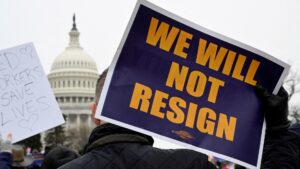The Shake-Up of Federal Employment: Implications for Workers and Retirement Plans
At the scrolling heart of Washington, amidst the historical grandeur of the U.S. Capitol, significant changes are shaking the federal job landscape. As Labor Union activists rallied in early February 2025, a wave of job cuts initiated during President Donald Trump’s administration continues to ripple through the federal workforce, with far-reaching consequences for American workers’ retirement plans—particularly among underrepresented communities.
The Perception of Stability
For decades, a federal job has been viewed as a bastion of stability, complete with generous benefits and a pension plan—a vestige of a bygone era when such security was more commonplace in the private sector. But as we now see, these perceived safe havens are clouded by uncertainty. With reports of widespread layoffs affecting probationary employees, many prospective workers are second-guessing their career paths.
Janine Wiggins, owner of Resumes by Neen, a job search coaching firm that specializes in assisting those seeking federal employment, notes a rising skepticism surrounding government jobs. “Before, I would get a lot of clients that wanted to work for the government because they viewed it as a long-term opportunity. That’s changing,” Wiggins observed. Many now question the security historically associated with public sector employment.
Disproportionate Impact on Minority Groups
The ramifications of these job cuts affect not just individuals but entire communities. The demographics of the federal workforce reveal a pronounced representation of Black Americans, who comprised nearly 20% of federal employees in 2021—significantly higher than their 13% share of the broader civilian labor force. The potential fallout from these layoffs is likely to disproportionately affect communities that are already facing economic challenges.
Take, for instance, Katrina Ayers, a 36-year-old single mother of three and technician for the National Guard in Mobile, Alabama. Attracted to her position by the allure of job security and health insurance benefits, Ayers illustrates the kind of impact these cuts can have: “I’ve been a federal employee for nine years. I know some folks depend entirely on the government’s retirement plans.”
Navigating Federal Retirement Benefits
Federal employees enjoy a multifaceted retirement package that includes Social Security, a 401(k)-like Thrift Savings Plan, and an annuity program known as the Basic Benefit Plan. While this system could provide a safety net, employees separated before retirement may find their benefits reduced or altogether inaccessible.
According to J. Mark Iwry, a former senior advisor at the Treasury, the Thrift Savings Plan is superior to many private sector counterparts. However, the defined benefit pension can be modest compared to some private plans and depends heavily on recent salary averages and years of service. This structure means that an early or unexpected separation from federal employment can lead to a significant reduction in expected retirement benefits.
The Wealth Gap and Its Implications
The wealth gap between Black and white Americans further complicates this scenario. Research shows that while higher-income Black individuals often face the pressure of supporting extended family, they tend to save less for retirement than their white counterparts. Factors such as lower stock market exposure and barriers to homeownership exacerbate this wealth divide, amplifying the vulnerability of minority workers in times of economic upheaval.
Craig Copeland, director of wealth benefit research at the Employee Benefit Research Institute, articulated a crucial point: "The increasing wealth gap means that Black households are less prepared for financial shocks. When faced with unemployment, they may be forced to liquidate retirement savings, further harming their future."
What Lies Ahead?
As the full extent of federal job cuts remains uncertain, legal challenges against such layoffs loom on the horizon. Companies like Elon Musk’s Department of Government Efficiency are facing scrutiny similar to that leveled against Musk’s previous ventures. Moreover, recent developments have seen some agencies, like the FDA, reinstating previously laid-off staff, hinting at the potential for some roles to be revived.
Ayers exemplifies resilience in the face of uncertainty. Though she has a backup plan should she need to transition to the private sector, she remains hopeful about her career in the federal government, stating, “I’m committed to applying for jobs. I believe in career progression and want to continue my invested journey in the federal sector.”
Conclusion: A Call to Adapt and Prepare
At Extreme Investor Network, we recognize that these changes present not only challenges but also opportunities for strategic planning. Now more than ever, it is crucial for individuals—especially those in minority communities—to seek financial literacy and diversify their income streams. As the federal employment landscape evolves, proactive financial planning and adaptability will be vital for weathering the storms of economic change.
For those of you navigating this uncertain terrain, whether within the federal sector or beyond, our network is here to provide in-depth insights and support as you build a more secure financial future. Join the conversation, explore our resources, and stay informed about the trends that can impact your retirement and overall wealth.
By distinguishing ourselves with expert insights specific to the current economic climate, we aim to become a trusted resource for our readers. Stay tuned to Extreme Investor Network for continuous updates and practical tips on ensuring a robust financial pathway for years to come!

